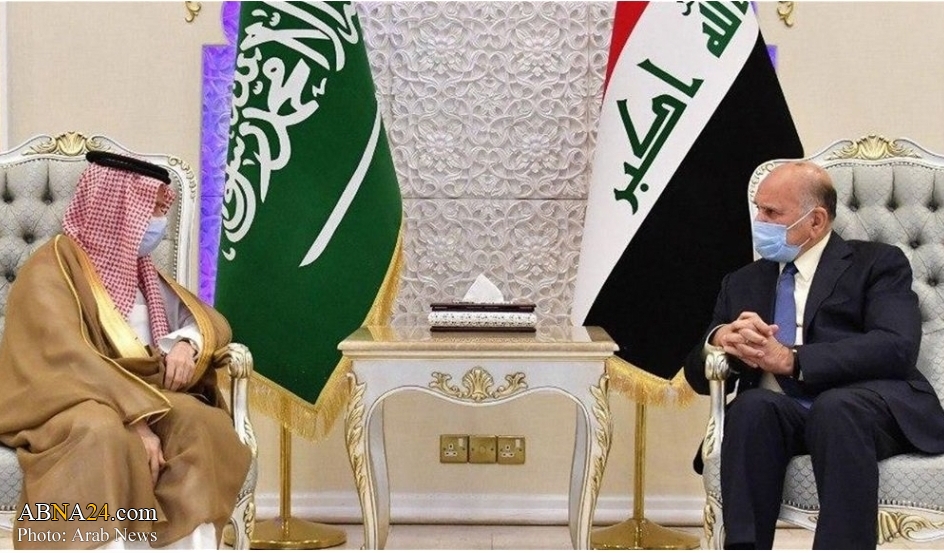AhlulBayt News Agency (ABNA): While the Saudi court is largely confused these days following the new US President's policy on Yemen war and Jamal Khashoggi assassination, Riyadh leaders have decided to host Iraqi officials. On Monday, Iraqi Foreign Minister Fuad Hussein visited the Saudi capital on an official visit at the invitation of his Saudi counterpart Faisal bin Farhan, the Iraqi foreign ministry stated. Fuad Hussein's visit came after official but unannounced visit of the Iraqi Interior Minister Othman al-Ghanemi to Riyadh on Sunday.
In recent months, visits by officials of the two countries have been increasing, and during the meetings, various agreements have been signed in the political, economic and security sectors. However, the specific circumstances of the two countries at the present time bring about different goals to each of them. Baghdad seeks realization to the economic promises of the Saudis but Riyadh wants to flex its muscles to the region and sow divisions in the Iraqi politics and also between Iraq and its closest ally Iran. This difference in views seems to overshadow the atmosphere of optimism about bilateral cooperation in the future.
PM Kadhimi’s formula to weather the challenges
While relations with Saudi Arabia have always been a contentious issue in Iraq's political scene since 2003 due to Saudi dissatisfaction with the overthrow of the Ba'athist dictatorship led by Saddam Hussein and the power gain of Shiites in Baghdad, which led to Riyadh's intervention and crisis making in Iraq after Saddam rule, the government of Prime Minister Mustafa al-Kadhimi during less than a year of its job reached out the most to the Saudis, scoring a record among the post-Saddam governments. The main reason for this is Kadhimi’s strategy to walk a tight line in Iraq's foreign relations, especially in the rivalry between two important and influential powers in the region and the Islamic world, Iran and Saudi Arabia, and to use this atmosphere to the benefit of Iraq's economic interests. This view of the current Iraqi government was strengthened, especially by Saudis’ show of desire to increase economic partnership with Iraq to counter Iran's soft influence in that country.
Saudi Arabia opened the Arar border crossing for trade with Iraq in November last year after three decades. The crossing was closed after the two countries severed ties following Saddam Hussein's invasion of Kuwait in 1990.
Also in November, a Saudi delegation led by the kingdom's ministers of trade, industry and agriculture traveled to Baghdad within the framework of the Saudi-Iraqi Coordination Council established to give their bilateral cooperation a boost.
Iraq, which has a single-product, unproductive economy, has been in dire straits economically in recent years due to falling oil prices, the damage caused by the rise of terrorism and the outbreak of the coronavirus, which has led to occasional popular protests. . Meanwhile, the interim government of al-Kadhimi, which has failed to find an effective solution to its economic woes, has laid most of its eggs in the basket of hope of fulfilling the repeated economic promises of the Saudis, perhaps in the time left until the parliamentary elections, scheduled for June 6, to be able to record a significant achievement in his name and turn it into a bridge to his success in the elections.
Therefore, pursuing the implementation of economic cooperation documents agreed in the previous negotiations is one of the main goals of sending the FM and the interior minister to the Arab monarchy.
Saudi Arabia’s political play with Iraq
As it was above mentioned, the Saudis follow mainly symbolic, propagandistic, and political goals behind closeness to Iraq. They in a general formula, as Lebanon experience shows, are opposed to success of Arab countries in which the Shiites have the major part of the political power. They now set their heart to change in Iraqi equations through continued economic hardship and popular protests.
The current crisis in Iraq has paved the way for Saudi Arabia to plan and intervene. Riyadh’s economic promises to Baghdad have been repeated since the premiership of al-Kadhimi predecessor Adel Abdul Mahdi and have never been fulfilled. But Riyadh believes that by engaging Baghdad in the mirage of economic aid through hosting Iraqi officials it can portray Tehran as an isolated party in regional developments in the propaganda and media milieu engineered after the defeat in the blockade on Qatar and the war in Yemen.
From another dimension, presence of Iraq’s interior minister in Riyadh reveals that security is on the agenda of the visits. Just against anticipations, Saudi Arabia did not react considerably to a drone attack last month on its territories, which was claimed by an Iraqi group. Therefore, the presence of the interior minister may signal that the Saudis seek security guarantees and government pressures on resistant groups in the Iraqi Popular Mobilization Forces (PMF).
/129

